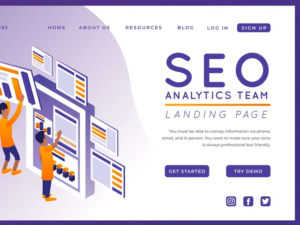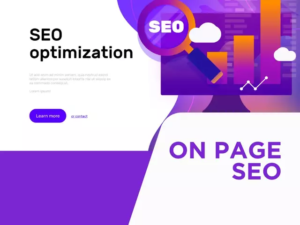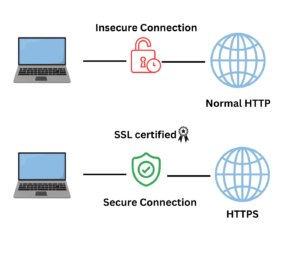On page SEO or on site SEO means improving the SEO of a webpage internally with internal SEO factors. Generally, on page SEO covers all the internal SEO components, such as internal links, title tags, page titles, and the content itself.
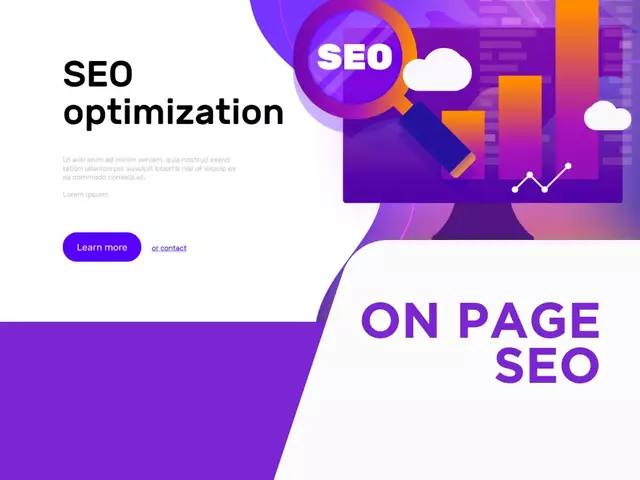
What’s the Difference Between On Page SEO and Off Page SEO
On page SEO
As mentioned above, on page SEO means optimising your web page, web content for a high-ranking search intent and organic positioning. It also covers SEO practices that enhance the search engine results of such web pages or websites.
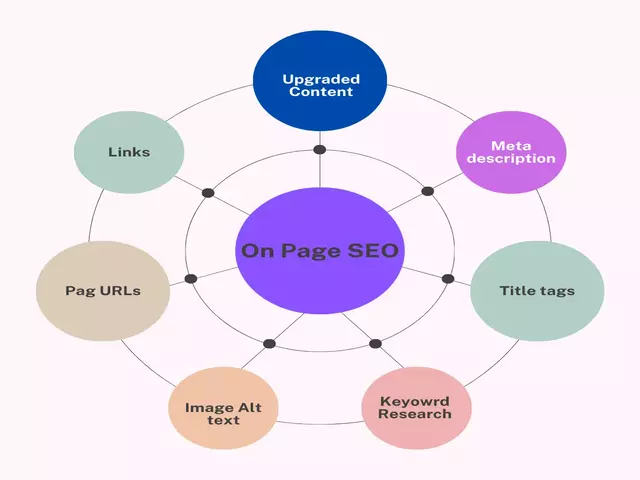
Generally, On page SEO is all the SEO content you can do to enhance your website’s search ranking so that it shows on top of Google results. What does this mean? This means on page SEO elements that can help rank a website higher in search results include:
- Optimised title tag
- Content that has related keywords in it
- A good meta description that shows up in Google’s search results
- Optimised page URLs
- High-quality content
- Effective target keyword usage
- Authoritative and structured data
So, in a nutshell, these are all the things you would do to enhance your website and its search engine ranking. And this is what on page SEO means.
Off page SEO
As the name suggests, off page SEO refers to all the stuff you do off your website to make it rank better on search engines. The purpose here is the same as on-page SEO: to enhance your website’s search engine rankings.
In general, an important aspect of the off page SEO strategy is to build trustworthiness among other websites, and to do this, you use backlinks and internal or external signals. Backlinks mean linking other websites to your website to direct web traffic to your site’s relevant pages. Backlinks are important because they form this link of hopping from one website to another, thus forming a chain of information. This delivers trustworthiness because Google’s algorithm lists trust as an important factor of off page SEO.
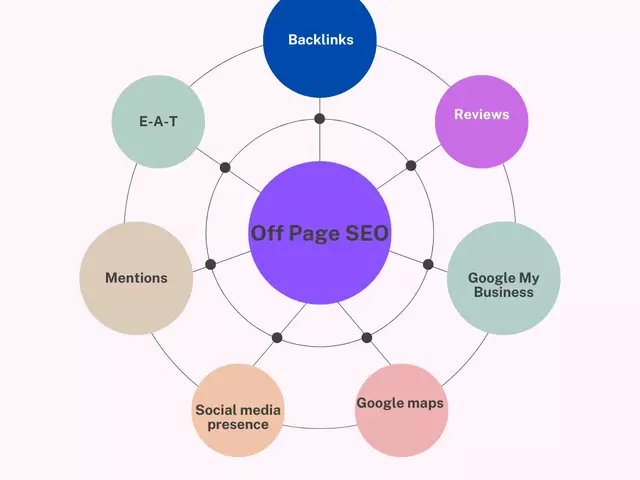
But backlinking or external links is just one part of off-page SEO tools. Engagement via social media also comes under the umbrella of off-page SEO because it builds brand authenticity, which also promotes your page online. Then, we have brand mentions and reviews that are also part of the off-page SEO strategy. Do you know Google appreciates and considers your website’s off page reputation, which mainly comes through online reviews and mentions of your website on high-authority websites? Page speed is also an important indicator of how well your off page SEO is.
So, to sum up, on page SEO means looking after your website’s SEO from within, and off-page means doing everything off-page to enhance your website’s search engine ranking or SERP.
Why is On Page SEO Important for Business Websites?
Any business’s main purpose is to bring users to their website and eventually make a sale or drive traffic. You can only do this if you have strong on-page SEO. So here’s an on page SEO checklist we’ve compiled that can help your business website grow as a brand or a business.
A Higher SERP(search engine results pages) Ranking
On page SEO is important for business websites because it ensures a good search engine ranking. As we’ve mentioned above, SERP is the ultimate goal of business websites, and to make this happen, you need to ensure your website has good on page SEO. This includes everything from title tags to meta descriptions, HTML elements, and keyword rich title tags.
Enhances Local SEO
As a local business, you’d want your website to reach a maximum number of audience or users locally in your area. On page SEO makes sure your local SEO is hand-synched with it. But how does local SEO work? To create a local presence, you must enhance your local SEO by using Google Business, Google Maps, reviews, etc. Your website can benefit from local SEO by using local target keywords such as “Indian food near me“. So, if you’re serving Indian food and have a Google business page and local keywords with positive reviews, you’ll have a good search engine ranking in your competitive local area.
Organic Web Traffic
As discussed before, improving your on-page SEO means you’ll attract organic traffic to your website. From a business perspective, search engines like Google, Bing, and Yahoo make up a large portion of organic or paid web traffic. This means top-ranking websites earn around 40% of their profits from this web traffic. Just a click on the website is earning them millions!
It is crucial to consider the importance of keywords here as well because that’s how you’ll reach your targeted audiences. Around 32% of your keyword traffic goes to the first results on SERPs, and around 90% of web traffic for a particular keyword goes to the first page of search results.
Return on Investment
You wouldn’t know this, but ROI and on page SEO are closely related. Regardless of what business you’re into, optimising your website for maximum ROI is very important. How? When it comes to digital marketing or business promotion, SEO is one of the most widely used techniques to do this. Which results in reliable and consistent ROI. You’ll be surprised to know that of all SEO techniques, digital marketing is the number one source of ROI or return on investment for your website as it tends to get you consistent web traffic over the years, thus generating long-term profit.
So, for these reasons, on page SEO is of utmost importance for your business website. As you can see, without such important elements, your business will not rank against your specific business-related keywords in search engines. Without an on page SEO strategy, competitors will hop over your website. Search marketing has a whopping 79% billion in revenue, which is exactly why businesses hire SEO strategists or SEO agencies to help them rank higher!
What is Google’s E-A-T?
If you are into SEO, you’ve probably heard about Google guidelines regarding E-A-T. These days, it’s more difficult than ever to rank your website on Google’s top-ranking pages. However, Google provides some elements to tackle this. E-A-T means Expertise, Authority and Trustworthiness.
Google uses E-A-T to see if your content has the right level of expertise, authority, and quality to rank on top search results. Google wouldn’t want low-quality content to be read or seen by users, so this is a guideline for its algorithm to display only high-quality content.
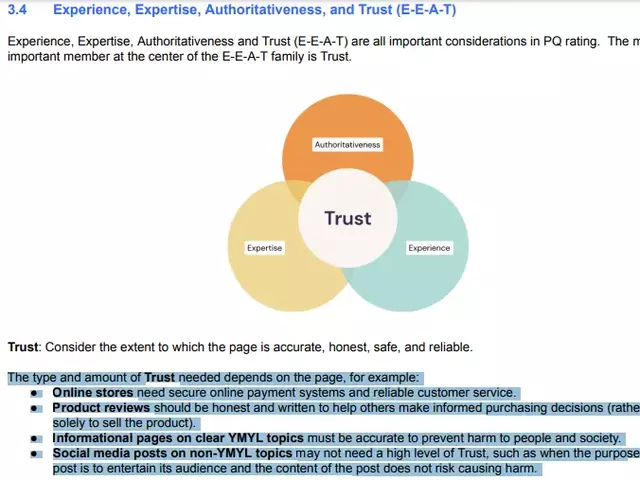
Expertise
Just like in any other field of work, you have to be an expert subject matter to be able to give your knowledge on a subject. Only then will it assert trustworthiness and reliability. The same goes for on page SEO.
Is your website presenting material and content that shows your expertise in a knowledgeable way? Are you using reliable search terms, keyword research, and internal linking to make your content worthy? Is your content meeting the needs of your customers? All of this needs to be considered to be able to rank on Google’s top search results.
Authoritativeness
Establishing yourself as a subject matter expert is just one part of E-A-T. In order to gain credibility, your content needs to be referenced, mentioned, and appreciated by other authorities and figures in your business field.
Only when your peers respect, or voice support for your content will your content be respected. So what better way to assert authority than a peer who praises your work?
Trustworthiness
The trustworthiness of your website can make or break your brand. Negative reviews can damage your image, so how can you build trust with customers? Start by putting their needs first and consistently delivering value. Build a strong reputation through transparent and reliable service, and showcase authentic customer reviews on platforms like Google and Trustpilot.
Although E-A-T is not a Google ranking factor yet ignoring this means putting your brand in a dangerous position where your competitors can take advantage of it.
Why is E-A-T Important for Your SEO?
With EAT, Google is telling you what it thinks is important or how your content can be a reliable source of information for others. With all the relevant keywords, users know that this website is more trustworthy than others, and thus, your website has a better chance of ranking on top of your competitors.
It’s important that when you improve your on-page SEO strategy, you take into account these three factors as well. However, keep in mind that while EAT is useful, it’s important for some content called” Your money, Your life.”
For example, you don’t need to adhere to EAT if you’re looking for memes or pictures of cute cats. But for content such as international news, law content, health content, medicine, or any other helpful information, you’ll need to follow EAT. This is because Google needs to make sure the content is authoritative and trustworthy and does not mislead viewers. These topics are called “Your life Your money”. So if you’re in a business around YLYM, then we encourage you to follow EAT.
How Does E-A-T in Your Content Achieve Great On Page SEO Goals?
There are many ways having EAT in your content boosts your on-page SEO as well. Let’s see how:
Authoritative Backlinks, Internal Links and Mentions
Boosting your content’s authority as a means of boosting your overall SEO means having high-authority backlinks and mentions. But why is having this off-page backlink or mentions important for your website’s SEO? Having a website and writing content with keywords and images is not enough. This is not called an Authoritative website, as it lacks credibility. Chances are Google won’t even rank it on top search results. However, those who recognise the importance of this factor will go a step ahead and build credible mentions from respective publications and individuals or institutions. They do this to enhance their content’s credibility and reputation. See the difference here? Getting recognised by a reputable third party is the key!
For example, if Centers for Disease Control and Prevention (a reputable source of information on medicines and health in America) cites your content as trustworthy, it’s a big win for your Website. Why? Because they are a reliable, professional body for Disease Control in the USA. This kind of recognition boosts your reputation as a trustworthy source of information for your audiences.
Updated Web Pages
As mentioned in the above passages, Google wants your content not only to be accurate but updated as well. Your search engine ranking relies heavily on how fresh, updated and accurate your content is (backed by credible sources).
So when search engine crawlers scan your page and see that you have not updated your articles or have stopped publishing articles altogether, it might be difficult to rank your pages even if you have added target keywords. Because the thing is, there is always someone who has fresh, updated content.
If you’re not constantly updating your content, search engines will not see you as an authoritative figure regarding your subject matter.
What is Google’s Featured Snippets?
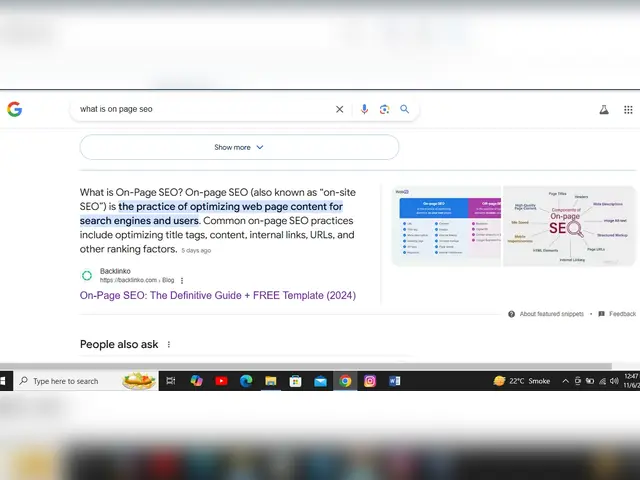
A featured snippet is that box that appears at the top results in the Google search engine. It answers whatever you’re searching for. The featured snippet comes before the link and has a heading or page title, relevant keywords, and a paragraph explaining your query.
By making featured snippets appear as the top result, Google helps its users identify what they are looking for easily.
Why does a particular featured snippet appear and others don’t?
Google’s automatic search rankings systems choose featured snippets based on how well they address the particular search query and how beneficial they are to the user.
Understand On Page SEO to Help with Rankings
So, to sum up, on-page SEO means optimising your website’s individual pages so that users, as well as search engine bots, can find information easily. If you’re building your brand, do take into account on-page SEO factors such as target keywords, image alt text, anchor text, and internal links to make your website trustworthy and authoritative.
Both on-page and off-page SEO help search engines understand that this website shows the most reliable results, so it deserves to be on top. If you need help with a website that is optimised for search engine, contact us at Web9.


